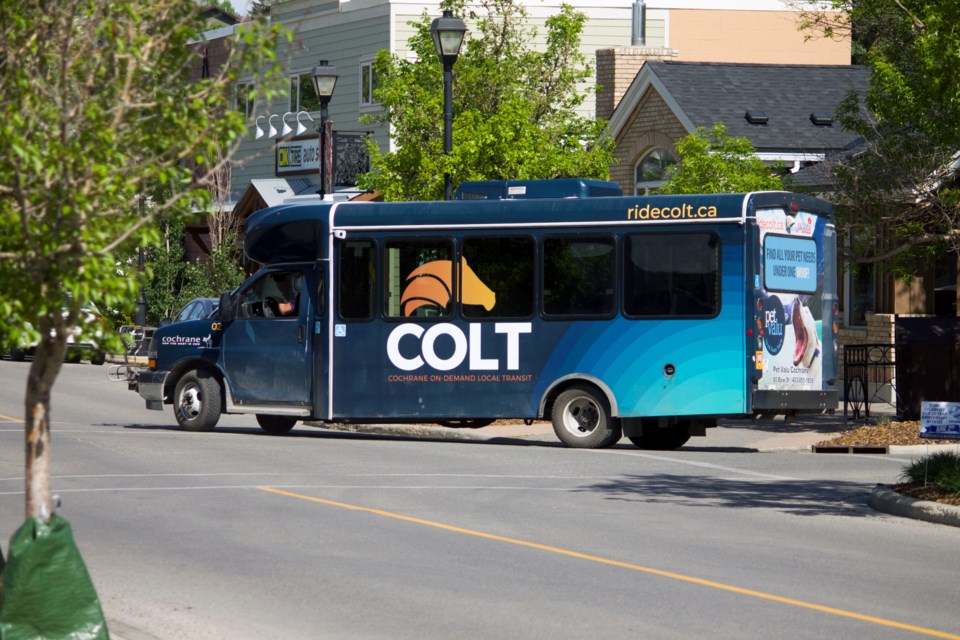Regular users of Cochrane’s much-maligned COLT transit buses will be watching closely to see if 2025 brings significant service improvements after at least 20 months of on-again off-again debate at Town Council.
The transit system has been an agenda item for council meetings numerous times going back at least to spring 2023. The conversations can be summarized as bouncing back and forth between ‘Let’s talk about it’ and ‘this is too confusing – let’s put this off and talk about it later.’
An anticipated in-depth discussion of the embattled bus system did not take place at the last regular council meeting of the year Dec. 9, when the 2025 Budget was approved.
COLT and the Rocky View bus operations will have a budget for 2025 of $1,841,691. In 2024 it was $1,061,783.
A hybrid system will be adopted, combining three fixed routes with on-demand service. A detailed plan outlining the changes will be presented to Council in the first quarter of 2025.
The hope is this new hybrid approach – which includes no new (or used) buses being added to the fleet – will address complaints documented by an exhaustive public engagement effort.
An example of the gap in service is illustrated by an attempted booking of a trip downtown from Sunset Ridge recently. A pickup was easy to book for the trip downtown in the morning, but the rider was on his own to get home in the afternoon, as there were no buses available.
Overall, over a quarter of requested trips go unfulfilled as a result of capacity constraints.
A review of the transit debate going back to Spring 2023 reveals a common theme: frustration.
In March of 2023 Coun. Morgan Nagel was not convinced COLT was a viable service worth continuing. He asked Administration for a dollar figure for cost per ride but was told that was not immediately available. He suspected it might be cheaper and better to pay for Uber.
“I just wanted to speak my truth – I don’t think COLT’s been very successful,” he argued.
Six months later Administration presented transit scenarios for Council’s consideration.
At that meeting, Coun. Tara McFadden said she felt frustration after Administration’s report, and most of council had weighed in on COLT.
“It feels very much like a chicken-and-egg conversation and nobody knows whether we should call it a chicken or an egg, or who’s in charge of calling it a chicken or an egg; so it’s still a very frustrating conversation all around,” she said.
She added that to hear that “nobody knows what’s going on, is quite frustrating.” She supports transit, but not at any cost.
Since 2023, the public has been engaged and re-engaged on what they want transit to be.
At the Oct. 15, 2024 regular meeting Council decided to defer debating future transit service levels in favour of bumping the debate to the overall 2025 budget discussions in November.
That detailed discussion never happened.
Completed and delivered to Council this fall, the Envision Cochrane 2050 document was conducted in two phases, asking Cochranites what kind of community they wanted.
Under the Mobility section, improved pedestrian, cycling and public transit networks were identified as a priority for Cochrane residents, with additional comments about road connectivity and capacity to alleviate traffic congestion.
The study gathered system data and feedback from two rounds of community engagement, which reached over 1,200 residents.
The What We Heard report demonstrated that 71 per cent of respondents supported modest tax and fare increases for enhancements like more buses, longer hours and Sunday service.
Currently, the fare for a single ride is $2.50, or $50 for an adult monthly pass.
COLT is largely funded by property taxes. Last year the Town spent 1.4 per cent of its budget on public transportation, including COLT and Rocky View Paratransit. The public transit budget represented approximately $56 per year of property taxes on the average home in Cochrane, of which approximately $41 funded COLT services directly.
Key findings of Envision Cochrane 2050 highlighted the need for enhanced reliability, safety, and accessibility, with frequency of service being the top priority.
The financial sustainability of the service was identified as important but ranked lower than that of operational improvements.
Mayor Jeff Genung is optimistic the new year will bring marked improvement.
“(It will be) a hybrid system with a couple of fixed routes, and the service hours that we’re currently seeing – not a reduction," he said. "There’s more money going to them in 2025 that will allow them to incorporate a program that will facilitate a better system."
Right now buses are on demand only but demand is outstripping supply – too many people are booking.
“Being able to hail a bus, rely on a bus, book a bus, is all going to improve,” said Genung.
Whether those become famous last words or just the latest installment in a long, long debate remains to be seen.



